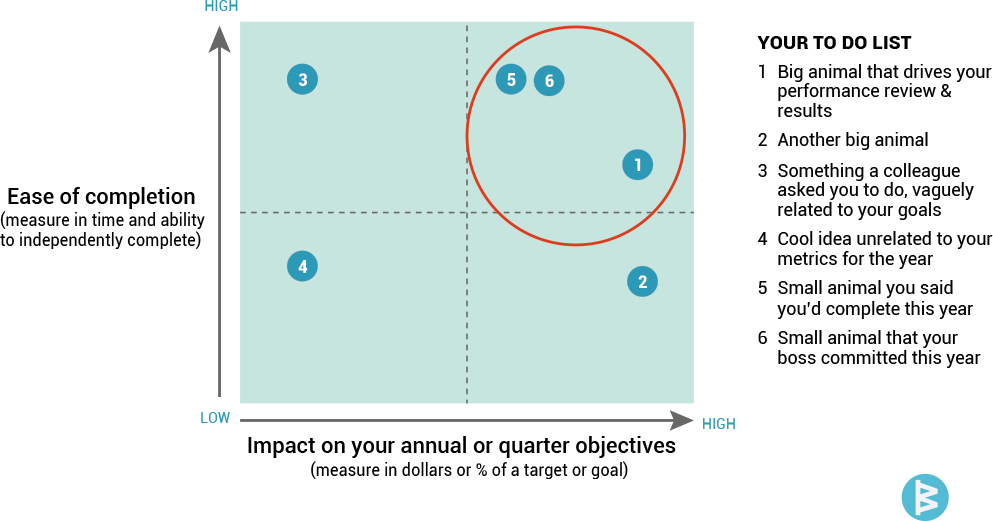Work stresses people out. In fact, 1 million Americans call in sick over stress every day and 25% say work is the most stressful thing in their lives. The volume of work, urgency of quarter or year end, competing demands and the need to succeed can merge into a sensation of being overwhelmed. When we’re overwhelmed, we rarely do or deliver our best.
These five tips can help you reclaim control over your time and your experience so you achieve real results with less angst:
1. Organize for Lower-Stress Success
Eliminate stress and increase your odds of achieving your goals by 64% by writing down what you need to do to achieve goals. If you manage a team, insist on transparency on what each team member is doing, where their attention is focused and what their progress is. If you don’t have a tool to see progress on actions and goals yourself, do a morning check-in with the team to align scarce resources in the remaining days. With clarity and transparency, you’ll stop worrying about what isn’t getting done and have more time and the facts to use days efficiently and effectively.
2. Prioritize Ruthlessly
Not everything on your list or the team’s can — or even should — get done. Ruthlessly prioritize where your time and your team’s should go every morning for the rest of the year. Spend your energy on work that ties clearly and directly to your quarter or annual goals and metrics … in other words, those things that actually move the needle for you and your boss. Using the matrix below can help distinguish what matters and make it easier to stop doing and stressing about the rest.

3. Don’t Sacrifice Yourself
When you’re most busy and stressed out (and the weather is bad), it’s tempting to sacrifice exercise and other healthy habits — don’t. Exercise and healthy eating reduce stress and increase your productivity as well as your perceived happiness. In fact, 20 minutes of exercise several days a week improves your happiness and productivity every day of the week! So set aside time even if it’s indoor yoga, stretching or working your own stairwell.
4. Change Perspective If You Can’t Change Circumstances
Examine the root causes of stress and the sensation of being overwhelmed. Which are self-inflicted, which are external and which are your reaction to internal and external conditions? If you can change the circumstances, then set out a plan to effect those changes to create long-term improvement. If you can’t change the circumstances and situation, consider changing how you relate to them. Ask a trusted advisor to give you a candid assessment of where you could revamp your response and reaction to the situation and be open to what you hear. In more entrenched situations, consider a professional coach to help increase your capacity to execute and achieve under duress.
5. Lighten Up
When you find your anxiety or anger rising, stop what you’re doing to stop what you’re thinking. Take a short walk or stand, stretch and take a few deep breaths. Try a few “compassion breaths” to relax and lighten your perceived load:
- Focus your attention on the sensation of anger, anxiety or stress — is it anxiety about lack of time, fear of failing or forgetting something critical?
- Rather than shifting away from the sensation, hold it in your attention.
- Now think about all the millions of people in the world you don’t know that have that same anxiety or worry.
- Take a long inhale, imaging that you are breathing in the collective anxiety, anger or stress of those millions of people.
- Exhale, imagining that you are breathing out calm, peace, success or the antidote to those worries to all who experience it, including yourself.
- Repeat three times, deepening your breath and holding it in longer each time and being more genuine in the compassion you convey with each out breath.
At the end, your sense of being alone with pressure will be replaced with more compassion for yourself and others — and your load will be lighter.
Unfortunately, when you are overwhelmed is the most difficult time to break the cycle – but shifting to and building the habits of success is infinitely better than staying mired in overwhelm:
- Set and share clear goals aligned with organization objectives
- Allocate your efforts to achieving your goals above all else
- Ensure you have the capacity to achieve goals operationally, emotionally, and physically
With more professional and personal capacity, you’ll feel and do great!
About the Author: Deidre Paknad is currently the CEO of Workboard, Inc. Workboard provides apps for managers and their teams to share goals, action items, status and feedback and to automate status reports and dashboards.
photo credit: adrian.coto via photopin cc
Post Views: 1,569